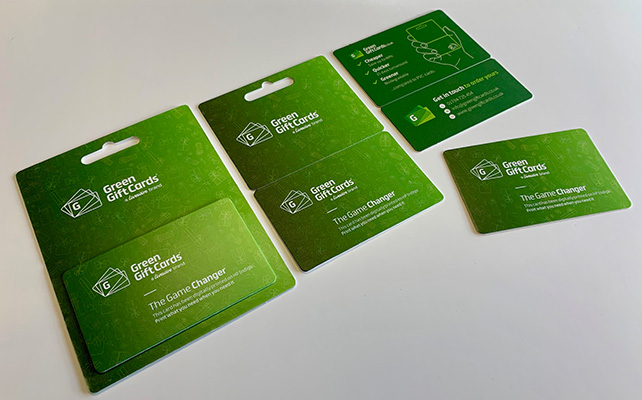
According to the GCVA (Gift Card Voucher Association), the UK gift card market is set to grow by 24.7% between 2019 - 25, hitting a total value of £8.71 billion in 2025. The benefits offered by traditional gift card printing has caught the eye of businesses large and small.
Gift cards are a popular choice with customers for presents, offering their recipients the freedom to select their own gift. However, when it comes to environmental impact and aesthetics, not all gift cards are created equal. In this blog post, we'll explore why paperboard gift cards are the true environmentally friendly gift card option.
What is the environmental impact?
The vast majority of plastic gift cards are made from PVC (Polyvinyl Chloride) plastic. Whether a gift card is made from recycled plastic or plastic that can be recycled, this versatile durable material has become the most common type of plastic in the plastic card printing industry.
However, PVC is highly toxic to us and our environment. PVC plastic does not break down for hundreds of years and when it does, it becomes microplastics which are detrimental to our health.
To tackle the never-ending plastic stream we find ourselves in, we recycle plastic to remake it into something new. This has become a popular alternative in the gift card industry. However, not all is what it seems.
Plastic Gift Cards - Inevitable Landfill
PVC plastic has a limited recyclable life. Each plastic card can be recycled 2 - 3 times before the fibres of the plastic become too poor quality to be used. As you can imagine, poor-quality PVC is disposed of in landfills or worse, it ends up in our waterways and the sea.
Throughout a PVC gift card's life time, it constantly creates CO2 from the manufacturing and recycling process only to break down into toxic microplastics at its end of life. The carbon footprint of custom plastic cards starts with the use of fossil fuels which contribute to the destruction of habitats and increased pollution in our atmosphere. The manufacturing process of producing PVC gift cards involves the use of chemicals that can be harmful to humans and the environment - poisoning waterways, animals and the ecosystem. Ultimately, the PVC cards end up in the landfill, breaking down into microplastic which further poisons us and the planet.
Whilst some types of plastic can be recycled, this uses further energy and creates more CO2. They too can often end up in the landfill.
The Carbon Comparison
| |
PVC plastic gift cards
|
Green Gift Card paperboard gift cards
|
| CO2 to make per card |
20 - 50g |
11g |
| Made from sustainable sources? |
No, plastic can never be made from sustainable or renewable sources |
Yes, paperboard gift cards are made from sustainably sourced trees. Green Gift cards are from the Iggesund paperboard mill and forest in Sweden. |
| Energy consumption |
Uses a lot of energy with toxic ingredients. |
Uses non-toxic ingredients manufactured in an EcoVadis rated carbon-neutral mill using only bio-fuels. |
| End-of-life processing and the likelihood of proper disposal |
It can be recycled but is typically disposed of in a landfill where it breaks into microplastics or incinerated, which produces CO2. Unfortunately, a lot is disposed of elsewhere like waterways. |
Can be recycled, composted in the household composter or left to biodegrade naturally. |
Cost-effective
As a lighter, faster material, paperboard gift cards typically have a lower price point than plastic, often making them an attractive alternative for small brands with limited budgets or companies who want to make a limited edition or small batch card. Green Gift Cards paperboard cards are used for membership cards, loyalty cards, and ID cards with or without RFID. They are available in full-colour double-sided print with different coatings and customisation.
Although they typically have a lower price point than plastic cards, our environmentally friendly paperboard is high quality with a unique layering that binds the fibres together, making it extremely durable. They also have a luxurious premium feel compared to plastic cards. These eco gift cards have been rigorously tested with water and friction with spectacular results. Although not entirely destruction-proof (it will damage if put in the washing machine, for example), in five years, we have had no issues with paperboard cards losing their integrity.
Brand image and perception
Customers are increasingly conscious of their corporate environmental responsibility and the actions taken (or not taken) by brands. An estimated third of customers look for brands with strong sustainable practices.
However, this has also seen the rise of greenwashing. So much so that there have been calls for legal legislation across the UK and EU to stop it.
The growth in customer’s interest in brands' environmental impact has put pressure on companies to be seen as ‘acting’ responsibly. However, brands found or seen to be greenwashing have seen a negative impact. In some circumstances, there have been reports of lost profits and decreasing customer loyalty.
At Green Gift Card, we offer a product that goes beyond the ‘eco-friendly label’ to offer a truly sustainable product. Opting for an eco-friendly gift card can enhance your brand's image and reputation, ultimately increasing customer loyalty.
Don’t limit yourself to gift cards. Green Gift Card’s paperboard can be used to make eco-friendly membership cards, sustainable ID cards and custom loyalty cards.
About our paperboard
The driving force behind Green Gift Cards is the concept that nothing (or very little) should go to waste. It was crucial to us to find a supplier who had a transparent process and could demonstrate they handle any resources in a genuinely sustainable manner. This led us to Iggesund, whose paperboard is above all others; this is why:
“It typically takes about 100 years for a tree to reach full maturity. During this time, the trees serve as a natural carbon storage, actively absorbing CO2. Iggesund is world famous for its management of tree harvesting in a sustainable manner. Approximately two-thirds of the harvested trees are used for sustainable construction and furniture production. The remaining third, which is traditionally considered a waste, might be discarded by other suppliers.
“However, Iggesund transforms the final third of the timber into wood chips. These chips are then processed into pulp for the production of paperboard, while the biofuel derived from them is used to power the Iggesund mill. This deliberate choice by Iggesund showcases their leadership in innovation and their commitment to minimising the ecological impact.
The outcome? A climate-conscious, FSC-certified, completely plastic-free, recyclable Green Gift Card. A future without waste in the gift card industry is on the horizon. What others consider as leftovers, we give new life to. Transitioning to Green Gift Cards is a simple yet effective way to demonstrate your company's dedication to environmental sustainability, aligning your values with those of your customers in the fight against single-use plastic and creating a plastic-free environment.” - Iggesund, bringing leftovers to life.
Ready to start your plastic-free gift card journey?
In our quest for sustainable and durable gift cards, paperboard gift cards sit happily on top of the podium. Paperboard is eco-friendly, easily customisable, desktop printer compatible, cost-effective, durable, and creates a positive brand image. By choosing paperboard cards, businesses and consumers can enjoy a guilt-free shopping experience.
At Green Gift Cards, we offer a wide range of custom recyclable gift cards with flexible and affordable options. Our paperboard cards are greener and cheaper, typically with a quicker turnaround than standard plastic gift cards. Our gift cards are durable and fully customisable without compromising on quality or ethics.
So, the next time you're selecting a gift card, consider the environmental impact of PVC and plastic cards and how paperboard cards can help your business’s loyalty grow. Contact us to start your journey to plastic-free sustainable gift cards today.






